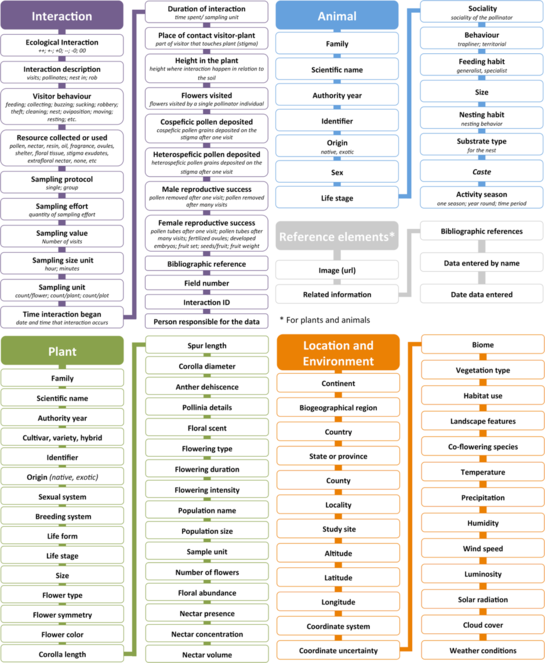|
Proceedings of TDWG : Conference Abstract
|
|
Corresponding author: Antonio M Saraiva (saraiva@usp.br), José A Salim (joseasalim@usp.br)
Received: 14 Aug 2017 | Published: 14 Aug 2017
© 2017 Antonio Saraiva, José Salim, Kayna Agostini, Marina Wolowski, Juliana Silva, Allan Veiga, Bruno Albertini
This is an open access article distributed under the terms of the Creative Commons Attribution License (CC BY 4.0), which permits unrestricted use, distribution, and reproduction in any medium, provided the original author and source are credited.
Citation: Saraiva A, Salim J, Agostini K, Wolowski M, Silva J, Veiga A, Albertini B (2017) Brazilian Plant-Pollinator Interactions Network: definition of a data standard for digitization, sharing, and aggregation of plant-pollinator interaction data. Proceedings of TDWG 1: e20298. https://doi.org/10.3897/tdwgproceedings.1.20298
|
|
Abstract
Pollination is considered one of the most important processes for biodiversity conservation (
Primary data about pollinators is becoming increasingly available online and can be accessed at a number of websites and portals. Many initiatives have also been created to facilitate and to stimulate the dissemination of pollination data, and examples are the Inter-American Biodiversity Information Network - Pollinators Thematic Network - IABIN-PTN (www.biocomp.org.br/iabinptn) and the WebBee (www.webbee.org.br) (
One important aspect of this trend is the strong reliance on standardized data schemas and protocols (e.g. Darwin Core - DwC and TDWG Access Protocol for Information Retrieval - TAPIR, respectively) that allow us to share and aggregate biological data, among which pollinator data are included.
Although plant-pollinator interaction data are critically important to our understanding of the role, importance and effectiveness of (potential) pollinators, they cannot be adequately represented by the current standards for occurrence data (such as DwC). The ways that interaction data are recorded and stored worldwide, as well as their intended use are very diverse. They lack of a common protocol and data schema, that will allow us to aggregate them in web portals and eventually use them to build decision support systems for conservation and sustainable use in agriculture, needs to be addressed.
The IABIN-PTN adopted a simple solution to characterize and digitalize plant-pollinator interaction data based on DwC (
Recently many Brazilian scientists gathered around the Brazilian Plant-Pollinator Interactions Network (REBIPP - www.rebipp.org.br) with the aim of developing scientific and teaching activities in the field. The main goals of the network are: generate a diagnosis of plant-pollinator interactions in Brazil; integrate knowledge in pollination of natural, agricultural, urban and restored areas; identify knowledge gaps; support public policy guidelines aimed at the conservation of biodiversity and ecosystem services for pollination and food production; and encourage collaborative studies among REBIPP participants.
To achieve these goals the group has resumed those previous works done under the auspices of the IABIN and FAO projects, and a data standard is being discussed. The ultimate goal is to adopt a standard and develop a database of plant-pollinator data in Brazil to be used by the national community. This proposal of a data standard (depicted in Fig.
Keywords
biotic interactions, pollination, pollinators, plant, data standard, Darwin Core
Presenting author
Antonio M. Saraiva
References
-
Uma proposta de esquema de dados de relacionamento entre espécimes.XXXIII Conferencia Latinoamericana de Informática (CLEI 2007) e Taller Latinoamericano de Informática para la Biodiversidad (INBI 2007),San Jose.
-
Establishing Knowledge Management Systems for Ecological Interactions: the case of crop pollinators. In: Gemmill-Herren B (Ed.)Pollination Services to Agriculture: Sustaining and Enhancing a Key Ecosystem Service.Routledge
-
Report of the Sixth Meeting of the Conference of the Parties to the Convention on Biological Diversity. https://www.cbd.int/doc/meetings/cop/cop-06/official/cop-06-20-en.pdf. Accessed on: 2017-7-12.
-
Preliminary guide regarding diverse conceptualization of multiple values of nature and its benefits, including biodiversity and ecosystem functions and services.draft 29.IPBES/3/INF/,868pp.
-
Pollinating bees: the conservation link between agriculture and nature.Ministry of Environment,Brasilia,313pp.
-
Managing ecosystem services: what do we need to know about their ecology?Ecology Letters8(5):468‑479. https://doi.org/10.1111/j.1461-0248.2005.00751.x
-
A common schema for managing plant-pollinator interaction data. In: Food and Agriculture Organization of the United Nations (FAO)Report on progress for GEF/UNEP/FAO Project: “Conservations and management of pollinators for sustainable agriculture, through an ecosystem approach.33pp.
-
WebBee - a Web - based Information Network on Bees.Revista de Engenharia de Computação e Sistemas Digitais1(1):77‑85.
